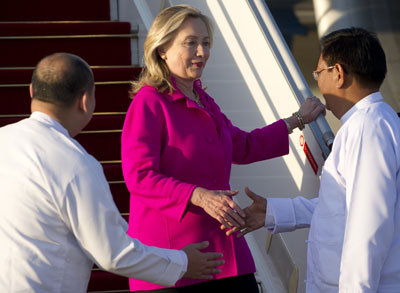When U.S. Secretary of State Hillary Clinton meets this week with Burmese President Thein Sein, opposition leader Aung San Suu Kyi, and senior ranking members of the military establishment, she conspicuously will not have the opportunity to meet with journalist Sithu Zeya.
Sithu was detained by police after recording the impact of a bomb that exploded in a crowded Burmese marketplace in April 2010. The journalist was sentenced to 17 years in prison on charges related specifically to his reporting activities, with an additional 10 years tacked on this year — soon after Thein Sein announced his intention to increase media freedom in Burma.
Sithu’s sentencing underscores the many contradictions between Thein Sein’s recent reform rhetoric and the still harsh on-the-ground reality for Burma’s independent reporters. While his civilianized government has talked up the need for more openness and press freedom, his regime still oversees one of the most repressive media environments in the world.
In recent weeks, international media have reported on the relaxation of the old military regime’s repressive ways, including new allowances under the state’s pre-censorship rule for news publications and the release from detention of over 200 political prisoners, as signs of positive change under the nominally democratic government.
Much has also been made of the officially unannounced, and thus easily reversible, lifting of government blocks on international and exile news websites that often report critically on the government and military. But the concession is at best marginal considering less than 1% of the population has access to the Internet. At worst, it represents a grave new threat to the country’s online news consumers.
The blocks were lifted in September, soon after the government imposed new surveillance requirements, including the installation of closed-circuit cameras, screen-capture programs and keystroke logging software, in public Internet cafes across the country. The repressive laws on Burma’s books means Internet users who access restricted materials still risk harsh penalties, including possible imprisonment.
Significantly, none of Burma’s recent media “reforms” have been fortified with amendments to the various acts and laws that allow authorities to jail reporters and dissidents for arbitrary reasons of national security. Those laws include the harsh Electronics Act, which threatens lengthy prison terms for anyone who sends unsanctioned information over the Internet.
Thein Sein is clearly on a charm offensive aimed primarily at removing the economic and financial sanctions the U.S. and European Union maintain against his country in punitive response to successive military governments’ abysmal human rights record. He is posturing as a reformist president under Burma’s new “democratic” order, but in-country journalists remember he served as hard-line prime minister under the old junta that routinely jailed their colleagues.
Clinton’s visit, the first by a secretary of state to Burma in over 50 years, is already being viewed as an early diplomatic reward for Thein Sein’s reform posture. The Obama administration has promoted guarded engagement with the regime and Clinton’s visit is expected to signal a first step towards the eventual removal of U.S. sanctions.
Recent and past history shows she should tread carefully. Burma’s ruling generals have repeatedly loosened their grip to allay international criticism, then tightened it again once outside pressure for change has been alleviated. The pattern has perpetuated repressive military rule for nearly five decades.
The still tentative reform signals emanating out of Burma today are thus nothing new. They come as the international community, including the U.S., has called for a U.N.-backed Commission of Inquiry into the regime’s human rights record and official acknowledgements that the local economy is badly broken after decades of mismanagement.
And while the Obama administration has publicly called for deeper reforms in Burma, the State Department knows the U.S. has been down this path before in the region. In the early 2000s, when Vietnam was bidding to accede to the World Trade Organization, the U.S. predicated its diplomatic support on a commitment from Hanoi to allow greater democratic and religious freedoms.
High profile dissidents were released and government leaders signaled a willingness to allow more openness. After entering the global trade club in 2007, Hanoi reverted to its authoritarian form by rounding up dissidents, journalists and bloggers in a crackdown that continues today. While Vietnam has since become a relative commercial success, with many U.S. multinationals heavily invested, it is still among the worst places in the world to be a journalist or activist.
The U.S. should avoid falling into the same trap in Burma. There is little indication so far that Thein Sein has the political courage or liberal intention to allow a truly independent press to flourish and scrutinize his government or the previous military regime’s actions, policies and personalities.
While government censors have in recent weeks allowed local publications to run interviews with Suu Kyi, they are still barred from reporting on crucial national issues, including an ongoing government assault on ethnic rebels in border regions, the controversial privatization of state assets and emerging rifts between factions in the government. By emphasizing that democracy cannot take root without legally guaranteed press freedoms, Clinton can ensure that Thein Sein’s reform pledges are not so easily overturned if and when U.S. sanctions are lifted.
While the international community debates whether Burma is changing profoundly or only incrementally, its media is still in shackles. And as long as enterprise reporters like Sithu and at least 11 others remain behind bars for merely covering the news, Thein Sein’s democratic reform vows should be viewed in Washington and elsewhere as more rhetoric than reality and not rewarded prematurely.
